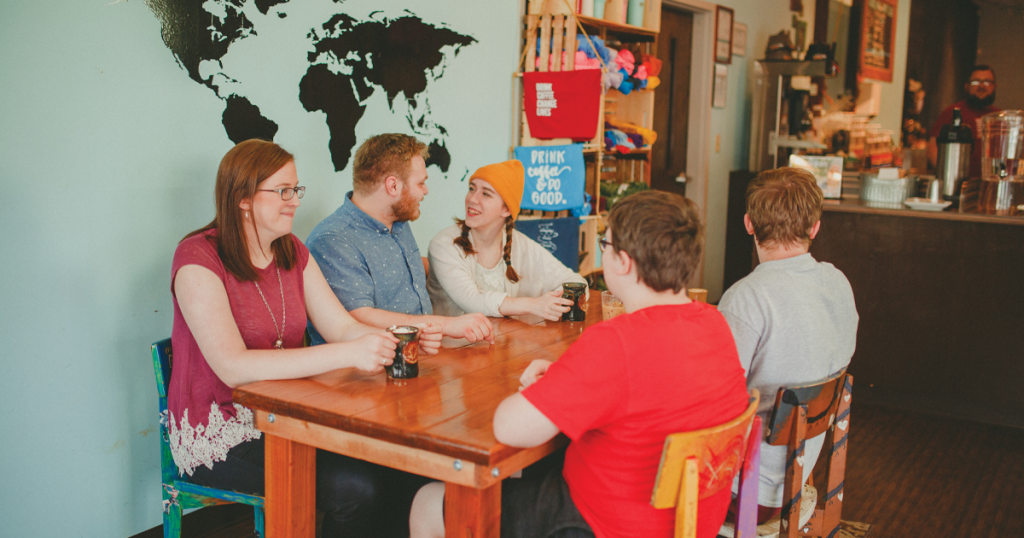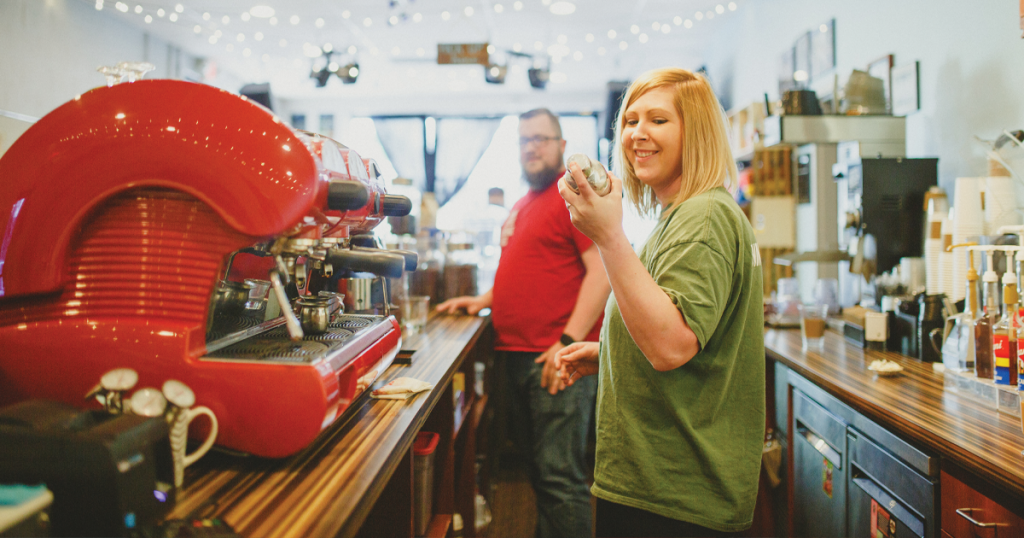Inman Coffee
“New Growth Out of What Was”
How does your local corps interact with your community? In the college town of Cleveland, Tennessee, The Salvation Army’s primary point of contact with students and residents of the town is a coffee house adjacent to the corps. Owned and operated by The Salvation Army of Cleveland, Inman Coffee is a wonderful shop that prioritizes ministry over profits.
It started when Joel and Cheryl Rogers moved into town and decided to go to church at The Salvation Army, which was just establishing its presence in Cleveland at the time. When their corps officer asked them what they were called to do and how they wanted to serve, they recalled their experience running a coffee house with their former church in North Carolina. Joel and Cheryl felt that the coffee house model was the best way to reach youth and young adults in Cleveland. “We live in the buckle of the Bible Belt. Churches on every corner. What we didn’t need was another traditional youth program or college ministry,” Joel says.
So, they pitched their coffee house idea to their officers and area commanders, who decided to make it a priority. Before long, the team found a new building that could serve as a corps, a coffee house, and a community and social services center; everything separate, but connected.
After much deliberation and many legal issues, the shop was called Inman Coffee, named after the street where the corps and the coffee house are located. Its logo, a stylized white phoenix on a blue background, was chosen carefully. “We want to be a space where people, no matter how broken they are, can find a community where beauty comes out of the ashes,” Joel says. “Where new growth comes out of what was.” He also says that the phoenix represents the approachability of the space that the Army has fostered there. With the iconography settled on, Inman Coffee opened its doors in October 2011.

Joel and Cheryl have official full-time jobs at the corps. While Joel is the Christian Education and Youth Program Director, and Cheryl is the Food Services Director, a large part of their jobs includes running Inman Coffee together. Joel says he runs the ministry and programs while Cheryl operates the business and logistics of the shop.
While Inman Coffee may not be the first coffee shop operated by The Salvation Army, it is distinct. There are other Salvation Army coffee businesses either open only a few days out of the week, or running out of an existing storefront like a thrift store. Essentially, Inman Coffee is the first Salvation Army-owned coffee house considered a dedicated coffee house rather than an extension of some other service. Inman Coffee is only closed on Sundays, to accommodate for a Sunday school class that meets in the coffee house then, and on Mondays, when youth programs take place in the shop.
The real goal of Inman Coffee is ministry and positive connections with the community. Joel explains that the idea behind Inman can be applied anywhere. “This concept, [it’s] not just a coffee house,” Joel says, “but a relational ministry center that fits the needs of your neighborhood. Because, really, that’s what we are more than anything … It wouldn’t have to be coffee everywhere. Different places, different needs.” The spirit of Inman Coffee is provision for the community, and that’s exactly what happens there. Joel talks about the many programs and events they hold at the shop, and the opportunities they provide for young people.
They offer everything one might expect of a trendy coffee house in a college town: trivia nights, movie nights and game nights for students, as well as “hygge” nights (based on the hygge concept from Denmark), when students turn off their phones, light some candles and gather for a meal as a time of relaxation in the present. And of course, there are plenty of live music performances. According to Joel, in their almost 11 years of service, Inman Coffee has hosted over 1,500 bands and musicians. He’s proud to say that some of the musicians that got their start at Inman have gone on to perform on “American Idol” and other various shows or tours.
“We try to be ‘launchers.’ We want to help people grow and become the very best that they can be in what they’re doing,” Joel says. “While we do that, we’re also teaching them about Christ. You don’t have to bludgeon people with the gospel. Sometimes it’s the subtle kindnesses that teach them more about who Jesus is.”
This methodology also extends to their staff, mostly interns going through a leadership program led by Joel and Cheryl. In the three-tiered internship, students identified as potential leaders will learn the basics of the food industry and administration business while doing devotions and undergoing training sessions. Towards the end of the internship, Inman’s connections allow for each intern to shadow someone in the field they are interested in pursuing. Joel and Cheryl have seen their interns go on to do amazing things, including become Salvation Army officers and youth pastors.
Inman’s award-winning coffee and all food items are sourced via direct trade from regions all over the world. Every farm is vetted to ensure that it has good employment standards and grows food without chemicals. “I can’t in good conscience lead somebody to Christ in this coffee shop today because I took advantage of someone in [developing countries] yesterday,” says Joel.

While Joel stated that Inman’s relational ministry model can be applied in any place and doesn’t necessarily have to be based out of a coffee house, he does think there’s room for the concept to grow. “We would love in a decade for Inman Coffee to be a brand that’s recognized as the place where you’re going to feel welcomed and loved. It’s not just a great cup of coffee, but a welcome environment,” Joel says. “We can help with all the marketing, and we’ve already endured the grueling meetings with copyright lawyers. Let us have done that hard work for a reason!”
–Report by David Reardon







